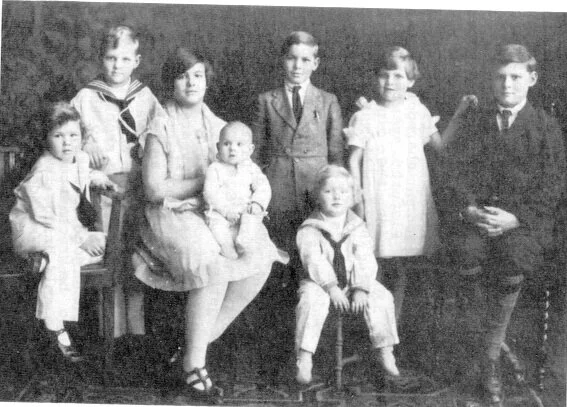Women’s History Month - Remembering Mississauga's Remembering Evelyn Kennedy
/In 1992, the Government of Canada designated October as Women’s History Month, marking the beginning of an annual month-long celebration of the outstanding achievements of women throughout Canada’s history. Women’s History Month in 2020 includes the International Day of the Girl (October 11) and Persons Day (October 18). For Women’s History Month we will be looking at the life and times of women who have left their mark on the story of Mississauga.
Born Mary Evelyn Mable Ellis (Evelyn) in Toronto in 1890 to Bessie and Dr. Austin Ellis, Evelyn Kennedy was a woman of great faith, spirit and optimism. She pursued many paths in her life: mother, teacher, caregiver, writer, producer, and war-worker. But those labels alone do not highlight the inspiring journey of her life.
In 1910, and without a teaching certificate, she accepted a teaching position at a one-room schoolhouse in the hamlet of Burnhamthorpe (in modern Mississauga). Shortly after moving here, she met her future husband, Jack Kennedy, at St. John the Baptist Anglican Church.
Evelyn had a spirit for adventure and travel. After a short stint teaching at Burnhamthorpe, she accepted teaching positions in Fisherville (Niagara area) and Cobalt. Jack followed, and the two soon became engaged. Jack and Evelyn were married in 1912 in Norwich, and made their first home in Cobalt. There they welcomed two children: Dorothy (born 1913) and Gordon (born 1914). In 1915 the young family returned to the Kennedy family roots in Dixie and Cooksville, first renting a house, and then moving onto a 140-acre Kennedy family farm property, near Burnhamthorpe and Tomken roads. Jack, who suffered from poor health, served as a Township Councillor from 1916 to 1921, and later worked as the Township Clerk.
Evelyn and Jack’s young family continued to grow. In 1916 they welcomed Douglas, followed by Bessie in 1917. Sadly Bessie died before she was one year old. More children followed: Arthur (born 1919), Muriel (born 1920), Ted (born 1922), Dick (born 1922), Harold (born 1926) and Donald (born 1929). In 1928, during a sudden and fierce storm, while the children were playing in the barn, lightning struck a metal ladder, and 15-year-old Dorothy was killed.
In 1931, Jack Kennedy, Evelyn’s husband, died of kidney failure, leaving Evelyn to raise 8 young children (7 boys!), between the ages of 17 and 2 years of age. It was the early years of the Great Depression, and with no social assistance, Evelyn, suddenly widowed and with many mouths to feed, had to chart a path forward.
In an effort to provide for her young family, and perhaps to give the children a creative outlet, Evelyn created “The Kennedy Kids”, a radio drama show which she wrote and in which her children starred. The popular show focused on the Kennedy family and community life around the family farm. Beginning in 1931 and running through 1935, advertisements in the Toronto Daily Star listed “Listen to the Kennedy Kids on CRCT every Tuesday and Thursday at 5:15pm.” Audiences were said to find the radio show hilarious, and full of “boys’ mischief”, including failed attempts at making cider, playing in the creek (and routinely losing their rubber boots), misadventures with fireworks, and “playing” with fire. It was broadcast in markets across Canada and in the northeastern United States, which was remarkable for radio programming in the early years of the Depression.
The program was quite unique at the time, and focused on the daily life of the children and the community of Dixie. The children were cast as themselves, and the show was initially aired on CBC radio, and later on CFRB, CRCT and CKEY.
The well-received show was lauded for highlighting the positives of community life and traditional values, and for focusing on family and laughter in a time of great turmoil and social stresses. The program ceased in 1935 due, reportedly, to Evelyn’s lack of time to write and prepare the scripts and that the children were growing, attending school, and the older ones beginning to look for jobs themselves. Evelyn Kennedy was recognized as a pioneer in children’s programming in Canada by ACTRA (Alliance of Canadian Cinema, Television and Radio Artists).
During the Second World War, five of Evelyn’s sons (Gordon, Douglas, Arthur, Ted and Dick) enlisted. In support of the war effort, in 1941 Evelyn found work at Dominion Small Arms Limited in Lakeview. After the war she also served as a teacher in two local one-room schoolhouses, and later ran a nursery school in her Port Credit home (she sold the farm, and in 1944 moved to a house in Port Credit).
She spent much of her later life travelling, spending long periods of time abroad. While on a trip abroad in 1960 she received the news that her daughter Muriel had been killed by a lightning strike – the same cause of death of her eldest daughter, Dorothy, in 1928.
Many of her sons were found work in Mississauga and abroad, each with a strong focus on the community – including long careers in provincial and municipal politics and public works.
Evelyn passed away at the age of 95 in 1985 and was laid to rest alongside her husband at St. John the Baptist Anglican Cemetery, Dixie.
For more information on the life and times of Evelyn Kennedy, we recommend When Lightning Strikes by Joyce Beaton. Additionally, a chapter in Extraordinary Lives: Inspiring Women of Peel by the Canadian Federation of University Women, Mississauga also highlights the story of Evelyn Kennedy.















